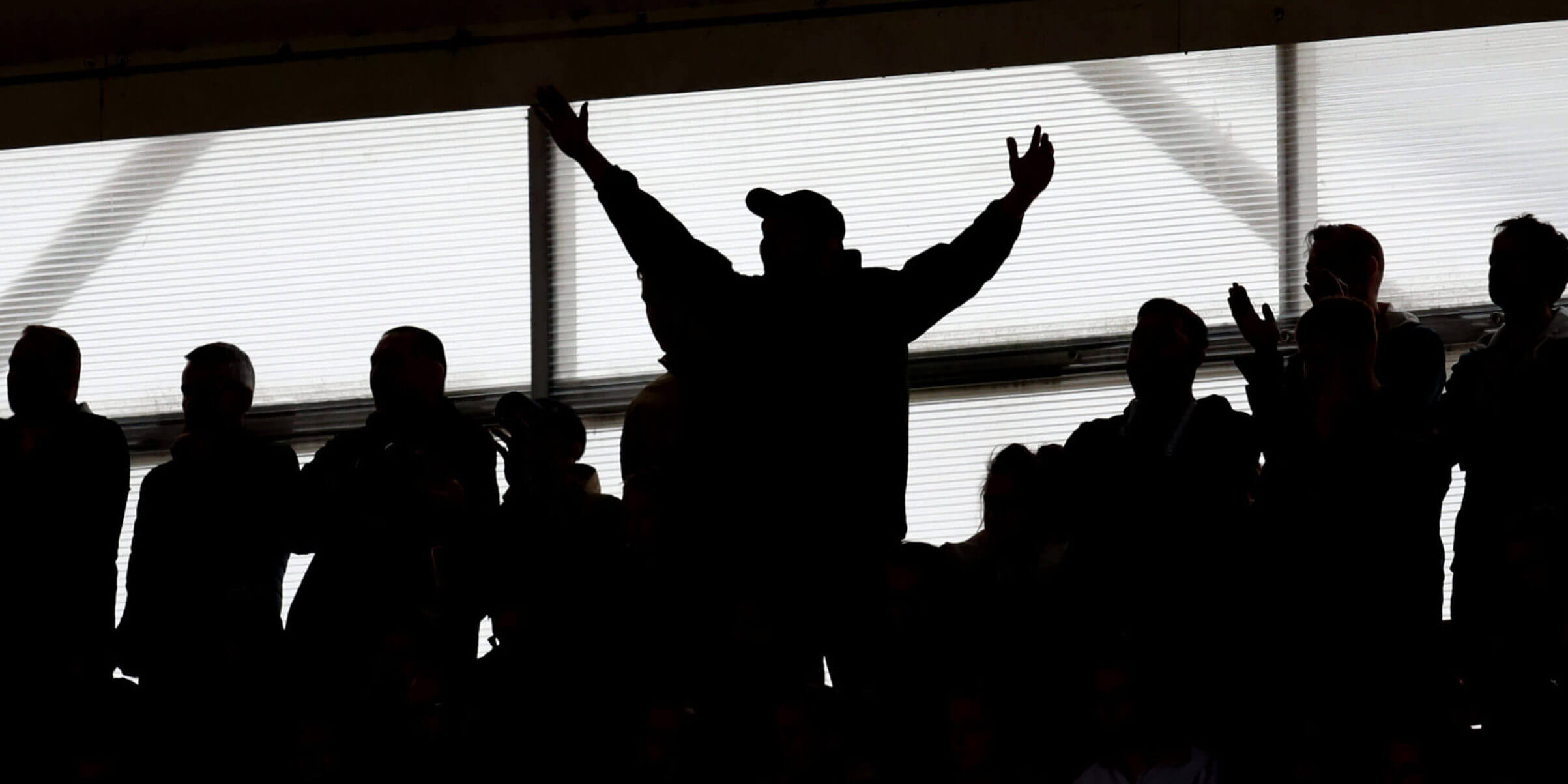Sports
‘It was 10 seconds of stupidity’: in the education course for banned football fans

His team was tied 1-1 at the time. It was late in the game, under the floodlights, when they missed an opportunity to take the lead.
And that’s when Tony, a Sheffield United fan, lost his cool and shouted something at Matt Turner, the Nottingham Forest goalkeeper, that he could never take back.
“We had just had a shot that went wide. The goalkeeper picked up the ball from behind the goal and made a small gesture to the away fans. Nothing bad, nothing that should have upset me, but I lost my cool for 10 seconds. I started yelling, “Go on, you f—–.”
“It was 10 seconds of stupidity. There were two people standing in front of me who immediately turned around and said: ‘You shouldn’t shout that, you shouldn’t say that.’ I knew they were right. “I know,” I said, “I’m sorry.” I knew it was wrong and that it could get me in trouble.”
The following day, Tony, who is in his 50s, was reported by his fellow Sheffield United fans. They had the number of his seat at Forest’s City Ground that day and a description of what he looked like. The club got in touch and he immediately accepted that he had committed homophobic abuse.
A letter arrived informing him that he had been banned from Bramall Lane, pending an investigation, and he was summoned to a police station to determine whether he should face criminal charges – or if there was any other way to deal with it to go.
This all brought Tony to the attention of Kick It Out, the largest anti-discrimination organization in English football, and led to him being referred to a fan education workshop as a form of out-of-court restorative justice.
Matt Turner was the target of ‘Tony’s’ homophobic slur. (Michael Regan/Getty Images)
Tony is not the fan’s real name. He does not want to be identified because of the impact the publicity would have on his family, but he has agreed to become the first perpetrator of Kick it Out’s anti-discrimination program to speak about how it works, what he has learned and the importance of education. perpetrators that their actions have consequences.
“I didn’t know Kick It Out had been around since the 1990s,” he says. “I thought it was something new and that it was just about racism. Until now, I had never really thought about other forms of discrimination. I’ve never done it wisely. But I now realize that I needed an education. I learned my lesson, but I also learned a lot more.”
We meet in Sheffield and early on Tony bends down to show something to Alan Bush, Kick It Out’s fan education and engagement manager.
“Look at this,” he says in a broad Sheffield accent.
He pulls up his pants leg and shows that he is wearing rainbow socks.
“They were a gift. That’s one of the craziest things about what I did. My daughter is gay. My stepdaughter too. They gave me the socks for Christmas.
He first met Bush in September last year, four weeks after the Forest match in which police became involved.
It was a two-hour workshop at the City Ground, Forest’s stadium, and Tony made it clear from the start that he was there to listen and learn.
Bush took him through the various forms of discrimination that pollute the game and spoke in detail about the impact a hate crime can have on its victims.
Bush told the story about a Tottenham Hotspur supporter who was mainly involved with the LGBTQ fan group Proud Lilywhites and stopped going to matches because of the homophobic chants.
Using a slideshow, he and Tony discussed the racist abuse suffered by England internationals Jadon Sancho, Bukayo Saka and Marcus Rashford, as well as the experiences of Blackpool’s Jake Daniels and the late Justin Fashanu as gay footballers. They talked about the Rainbow Blades (Sheffield United’s LGBTQ group), why it needed to exist and how the members would feel if they heard one of the club’s supporters shouting homophobic insults.

Sheffield United captain Oliver Norwood will wear a rainbow armband against Burnley this season. (Matt McNulty/Getty Images)
Bush then explained the consequences for violators, including the threat of lawsuits, prison sentences and travel bans.
“Throughout the session, (Tony) became increasingly aware of his misconduct,” Bush said. “When we got to the hate crime legislation and the consequences, he looked shocked at what a different outcome could have been for him, and how it could have changed his life.”
This is Bush’s specialist subject. Kick It Out’s referrals come from the police or the football clubs and Bush’s job is to meet offenders one on one and pass on his recommendations to the relevant clubs. In the past three years he has provided more than 200 sessions.

“The most important thing to remember,” he tells Tony, “is that even if you call it a moment of madness, it’s still a hate crime. It caused intimidation, alarm or fear. As a result, you can appear in court and receive a football ban. You could lose your job and have all kinds of other consequences.”
It undoubtedly helps that Bush is deeply entrenched in football culture. He dresses like a fan because that’s exactly what he is. He has been going to Newcastle United, home and away, since the days of open terracing at St James’ Park. He’s a big guy – close-cropped hair, Fred Perry shirt, old-fashioned Adidas trainers – and it’s easy to see why the average man on the street would identify with him more easily than, say, an eligible Premier League manager.
It also doesn’t take a long stay at Bush’s company to realize that he cares deeply about his work. He is trained in hate crime procedures and has worked in London as an anti-social behavior officer.

Alan Bush, who runs the Kick It Out course for banned fans. (Kick it out)
“At the end of the session he asked what I was going to do if I could go to competitions again,” says Tony. “I said to him, ‘I’ll just sit quietly and jump up if we score, which doesn’t happen very often as a Sheffield United fan.’
But Alan said: ‘I don’t want you to be like that, it’s okay to jump up and shout all you want as long as it’s not racism, it’s not against people with disabilities, gender reassignment or religion and belief’. . You realize that football is not just for white, straight men. It’s for everyone.”
Of all the people who attended the Kick It Out rehabilitation workshop, Bush can remember only one time when he found it difficult to get the message across to someone: a man who shouted an anti-Muslim term at an opponent.
Only one person, a member of the England Supporters Travel Club, has reoffended. That person was banned from football for three years and when that expires, Bush will probably see him again. However, the vast majority of people respond more positively. Many perpetrators cannot explain why they did what they did.
In Tony’s case, it didn’t seem to matter on the night that the player he abused was straight. The slur was just a thoughtless insult that he could have used against any opponent at that moment. He had not been drinking and did not consider himself homophobic.
“He couldn’t give a specific answer about his actions,” Bush said. “He kept saying it was stupidity, that he wasn’t thinking and that maybe it was ‘banter.’ But he couldn’t settle for a real reason that he liked. His main response was that his behavior was wrong and that he wished he could turn back the clock.”
He was also lucky, in one respect. The people who reported Tony did not want to go to court. “I had all these worries hanging over me,” he says. “Your name is in the newspaper, your address is in the newspaper, you are banned from football (by the court) … you are publicly humiliated.”
Instead, it is possible to take some positivity from Tony’s story. If Kick It Out’s purpose is to educate people and make football a better place, Tony shows it can be done.
Tony talks about passing on what he has learned to the friends sitting next to him on the Sheffield United Kop. He admitted what he had done and told them to make sure they never repeat his mistakes. This also goes beyond football. “I work with gays,” he says. “Before I took this course, I probably would have said something to them in jest, but now I don’t. Because it’s not a joke, right? So I also brought it to my workplace.”
Bush concluded that the person sitting in front of him “needed no encouragement to demonstrate genuine remorse, understanding and empathy throughout his learning journey.”
“I felt (Tony) was honest with us when he talked about how ashamed he was of his behavior,” Bush said. “My gut feeling, after looking into his eyes for just over two hours, was that he was truly sorry for the pain his words may have caused. On this occasion, the community resolution and out-of-court recovery approach was the right solution.”

Sheffield United fans fill Bramall Lane. (Darren Staples/AFP via Getty Images)
The sport as a whole may well need more specially trained experts who, like Bush, can pass on their knowledge in this area. After all, this is a time when more and more people are heeding Kick It Out’s message to report discriminatory acts. Last season there was a record number of 1,007 reports. The numbers are still rising, making the role even more important.
Singing tragedies has also come under Bush’s purview and while he is well aware of the need for punishment, his firm belief for all different types of offenses is that clubs should not issue lifetime bans. “I hate that term,” he says, “because there is no return from it.”
For the relevant people at Kick It Out, it is much better to educate offenders and ensure that when those people are allowed back into the stadiums, they have changed their mindset and have a much better understanding of what is acceptable and what is not .
Tony is the perfect example of this: a man who describes himself as “old-school” but now also says he “appreciates the underrepresented groups in today’s society and why it is important to be respectful.”
He has been cleared to re-enter Bramall Lane after signing an ‘ABC’ (Acceptable Behavior Contract) and says he is keen to meet the fans who reported him. He wants to apologize politely.
He also did something no one at the Kick It Out course in question had done before: he emailed Bush the next day and asked if he could come back to see him again. And that should be the sign of a job well done for Bush.
“Thank you for inviting me to the Kick It Out session,” it said. “I wanted to learn as much as possible from subject experts like you. I found the course very informative and a real eye-opener.
“I learned a whole host of things, from the differences between misogyny and sexism to what is and isn’t socially acceptable to say, shout or sing.
“I have taken away enormous amounts of information and I am significantly more aware of the impact comments can have on other people. I once again deeply apologize for my ignorant words.”
(Top photo: Catherine Ivill/Getty Images)













